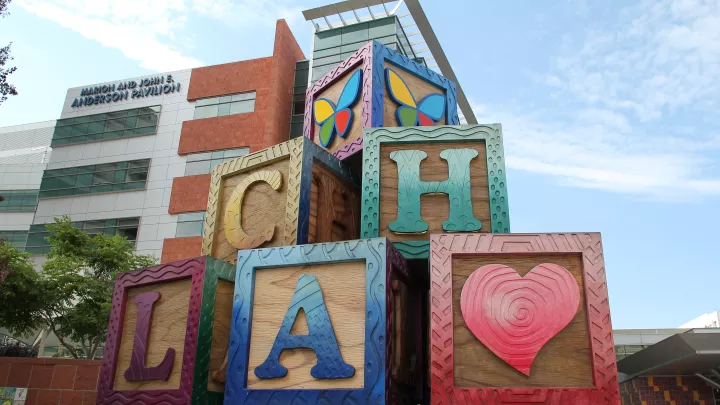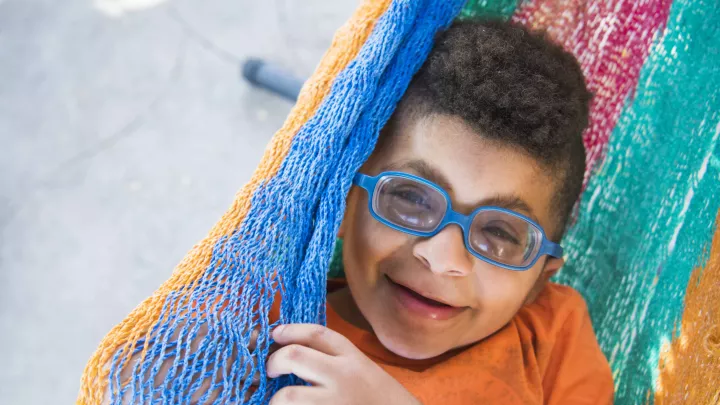Wilms Tumor and Genitourinary Tumor Treatment
Genitourinary tumors affect the kidneys, bladder, ureters (tubes that connect the kidneys and bladder) and genitals. Many of these tumors can affect children, including a childhood kidney cancer called Wilms tumor.
The best care for genitourinary tumors should involve pediatric urologists, children’s cancer specialists and counselors. At Children’s Hospital Los Angeles, your child receives care from all these specialists. Our team treats childhood tumors with advanced therapies that provide better outcomes.
Treatment for Wilms Tumor and Other Genitourinary Tumors: Why Choose Us
Your child and family receive:
- Complete care: We take a comprehensive approach to caring for childhood cancers and tumors that affect the kidneys, bladder and reproductive organs. Children’s Hospital has every specialty and service your child needs, including chemotherapy, radiation, surgery and mental health.
- Emotional support and counseling: Our families receive care for both physical and psychological needs. Your care team includes experienced, compassionate counselors and mental health experts who support you every step of the way.
- World-leading research: As an academic hospital, we have access to the most advanced treatments available. Our clinical trials and research programs are exploring the best techniques for Wilms tumor surgery. This research includes ways to spare healthy kidney tissue and provide better long-term outcomes after surgery. Learn more about our pediatric urology research for patients.
- Expert team: Children with genitourinary tumors need a multidisciplinary team on their side. At CHLA, children receive seamless treatment with a care team assembled for their unique situation. Your child’s team may include experts in:
How We Treat Genitourinary Tumors and Cancers in Children
Our pediatric urologists offer an advanced level of care for every type of genitourinary tumor, including:
- Wilms tumor (nephroblastoma)
- Germ cell tumors (GCTs)
- Other tumors of the kidneys, bladder, ureters and reproductive organs
Wilms tumor (nephroblastoma)
Wilms tumor is a childhood kidney cancer. Treatment for kidney cancer in children involves a combination of:
- Chemotherapy, a powerful medication that kills cancer cells
- Nephrectomy, surgery to remove all or part of the affected kidney
- Radiation therapy, which uses high-energy beams to destroy cancer cells
We customize your child’s treatment based on the size and stage of the tumor. Our pediatric urology surgeons work closely with CHLA’s oncologists and radiation oncologists to ensure your child receives seamless care.
We also support your family through our social work and Child Life programs. Learn more about our Child Life Program.
Germ cell tumors (GCTs)
Germ cell tumors affect the reproductive cells in the body, often in the ovaries and testes. These rare tumors may be benign (not cancerous) or malignant (cancerous). Your child’s treatment will depend on the location, type and size of the tumor.
Germ cell tumor treatment may include some of the following:
- Surgery to remove the tumor
- Chemotherapy or radiation therapy to destroy cancer cells
- Hormonal replacement, which is medication that corrects hormonal imbalances
Our pediatric urologists are skilled in removing germ cell tumors. And your child receives coordinated care from different medical specialties when needed. Our comprehensive approach means we can cover all your child’s medical needs.
Other tumors of the kidneys, bladder, ureters and reproductive organs
Other types of genitourinary cancer in children include:
- Bladder cancer in children
- Pediatric cancers and tumors of the testicles
- Pediatric ureter tumors and cancers
These conditions are uncommon, but our team has experience treating every type. In most cases, our pediatric urologists perform surgery to remove the tumor. Your child’s treatment may also include radiation or chemotherapy.
We combine our expertise with other Children’s Hospital specialists to deliver complete care to your child—no matter how rare or complex the tumor is. Other doctors your child may see include:
- Endocrinologists (hormone specialists)
- Nephrologists (kidney specialists)
- Oncologists (cancer specialists)
- Physical therapists (muscle and movement specialists)
- Radiation oncologists (radiation specialists for cancer treatment)


